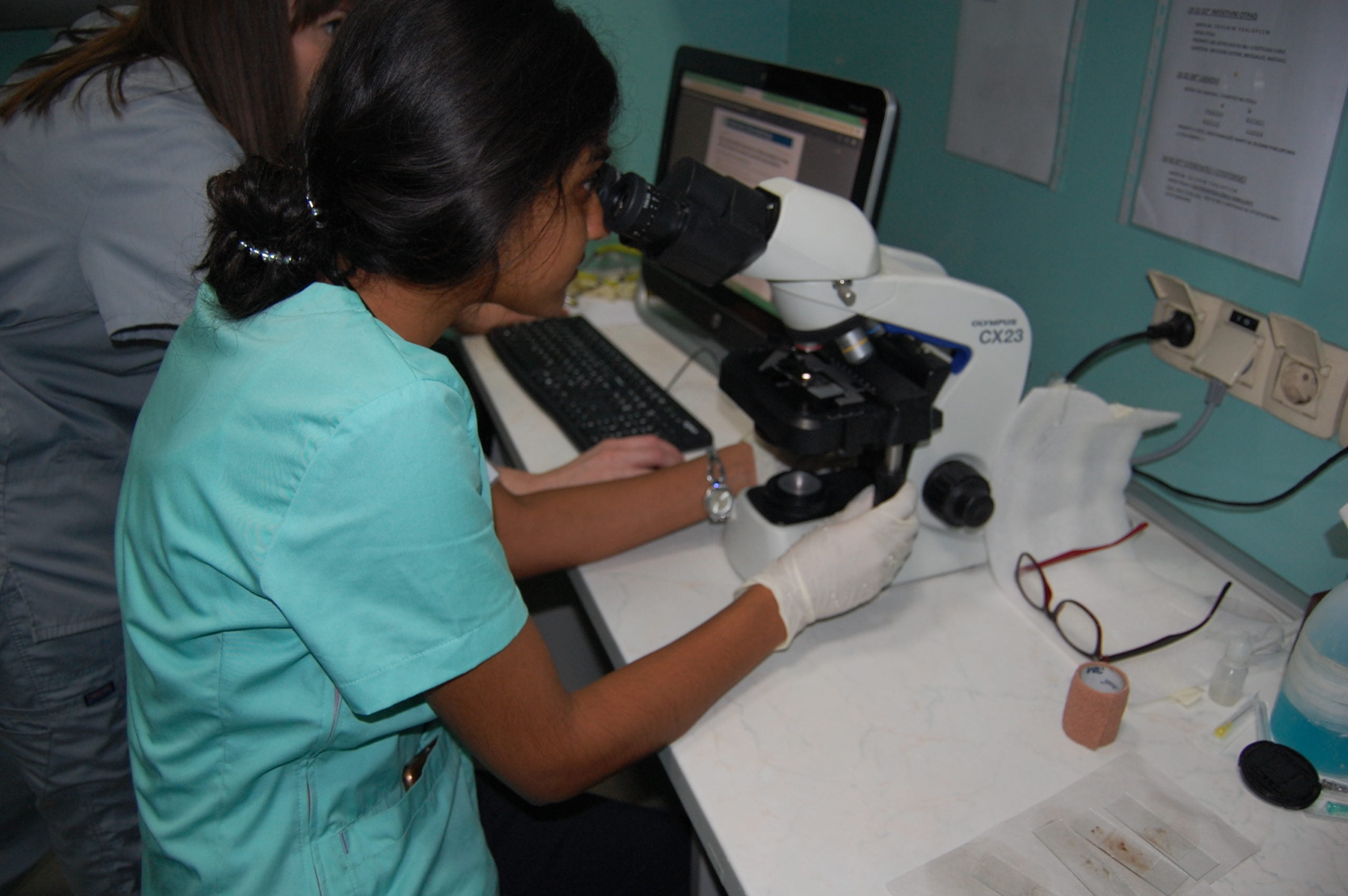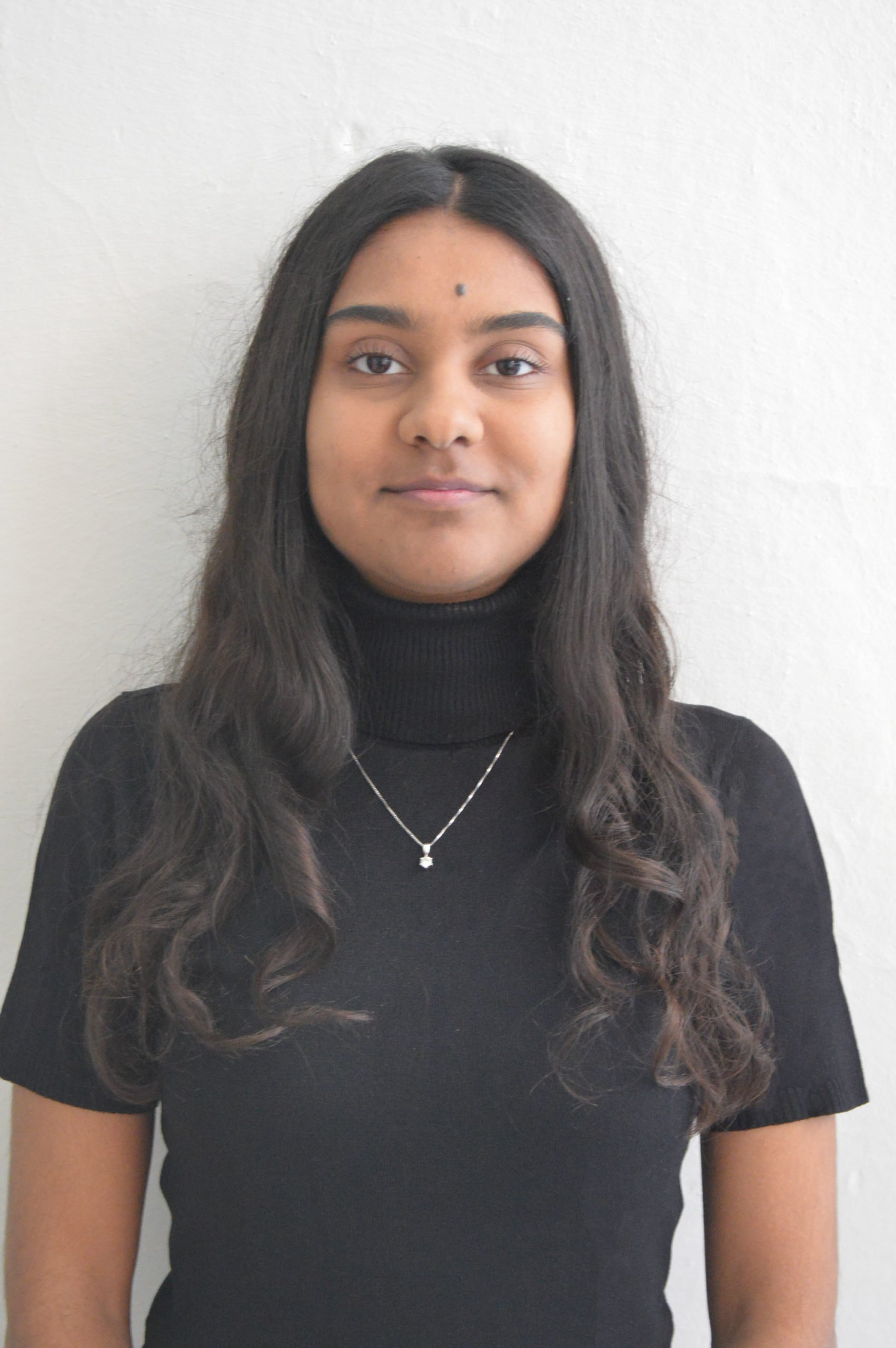
Armela Lato is a final year student at the veterinary faculty in Tirana. She initially wanted to study medicine but her exam score was not good enough for the Faculty of Medicine. Armela was not a great animal lover but decided to attend the Faculty of Veterinary Medicine as it was closer to what she had originally wanted to study.
“At the time this was a provisional solution for me. I was planning to apply again for medicine the next year,” says Armela. However, during the first few months at the faculty she changed her mind and began to consider the work of a vet as a lifetime profession.
The Faculty of Veterinary Medicine in Tirana had good professors, and this is one of the reasons why Armela was happy with it. “The professors supported us in every way and they were friendly,” she says. They also gave her a new vision for her work – she remembers one of her professors saying that, “if you help animals you help humanity, because the lives of creatures on our planet are interconnected”. However, the faculty had limited resources both in terms of equipment and the number of patients coming to the faculty clinic. Armela’s theoretical knowledge was improving but she needed to improve her practical skills.
“Give an animal a little care and it will be grateful forever.”
Finding the practical skills
Ever since high school, Armela had wanted to study abroad. One of the reasons for this was a better chance of employment. “Finding a job in Albania is not an easy thing. But If I graduated abroad, I could have an internationally recognised diploma and a better chance to find a job abroad,” she explains.
With this in mind she began to look for opportunities for scholarships to study outside Albania. In her third year of studies, she saw an opportunity from the Erasmus+ student exchange programme published on the faculty portal. She had three options: Bologna, Milan and Zagreb. With visions of the opportunities she’d be able to explore in Croatia and Italy, she applied for all three.
“I was accepted in both Milan and Zagreb, but I chose Zagreb, as my professors said that they thought that the Faculty of Veterinary Medicine there was better equipped, and has a longer tradition,” says Armela.
Zagreb adventures
She began her experience at the Faculty of Veterinary Medicine in Zagreb in the second semester of her third year of studies, and stayed there for six months. Telling the story of her stay she says wide-eyed, “It was very different there: much better.” The faculty clinic was better equipped than the one in Albania. Apart from surgery equipment they also had advanced diagnostic equipment such as echography and radiography that were not available at the faculty in Tirana. “We also had a much larger number of patients coming to the faculty clinic, and the equipment was available to use whenever we wanted. This was amazing.”

“We had a much larger number of patients coming to the faculty clinic, and the equipment was available to use whenever we wanted. This was amazing.”
Armela also had difficult experiences during her stay in Zagreb. At the clinic they had patients with serious uncurable illnesses whose owners chose euthanasia in order to relieve them from pain. This was one of her encounters with the distressing side of the profession. She learned the hard way that not every patient can be saved.
Throughout her stay Armela had the chance to learn new things. For example, she learned about a blood disease that she had never heard of before and whose diagnosis depended on measuring the size of the bones and skull, as one of the symptoms of this disease was the shortening of these parts of the body. “It was fascinating how they diagnosed the disease step by step and compared the symptoms with two or three other possible diseases before coming to their conclusion,” she says.
Future plans
After all she learned in Zagreb, Armela is now even more committed to continuing her career as a vet and to excelling in the profession. Once she’s graduated she’s aiming to study dermatology or physiotherapy at postgraduate level, preferably at a university abroad, and then to come back to Albania and try to set up her own clinic, or work in a state veterinary institution.
Studying veterinary science changed one other thing in her life. Although she had never hated animals, she says she just did not have any affection for them. In particular she had a strange dislike of cats. ‘I don’t know why but I simply could not look at or touch cats. But now I have a cat of my own,’ she smiles.
‘Give an animal a little care and it will be grateful forever,’ says Armela.
Photo credits: Armela Lato
“At the time this was a provisional solution for me. I was planning to apply again for medicine the next year,” says Armela. However, during the first few months at the faculty she changed her mind and began to consider the work of a vet as a lifetime profession.
The Faculty of Veterinary Medicine in Tirana had good professors, and this is one of the reasons why Armela was happy with it. “The professors supported us in every way and they were friendly,” she says. They also gave her a new vision for her work – she remembers one of her professors saying that, “if you help animals you help humanity, because the lives of creatures on our planet are interconnected”. However, the faculty had limited resources both in terms of equipment and the number of patients coming to the faculty clinic. Armela’s theoretical knowledge was improving but she needed to improve her practical skills.
“Give an animal a little care and it will be grateful forever.”
Finding the practical skills
Ever since high school, Armela had wanted to study abroad. One of the reasons for this was a better chance of employment. “Finding a job in Albania is not an easy thing. But If I graduated abroad, I could have an internationally recognised diploma and a better chance to find a job abroad,” she explains.
With this in mind she began to look for opportunities for scholarships to study outside Albania. In her third year of studies, she saw an opportunity from the Erasmus+ student exchange programme published on the faculty portal. She had three options: Bologna, Milan and Zagreb. With visions of the opportunities she’d be able to explore in Croatia and Italy, she applied for all three.
“I was accepted in both Milan and Zagreb, but I chose Zagreb, as my professors said that they thought that the Faculty of Veterinary Medicine there was better equipped, and has a longer tradition,” says Armela.
Zagreb adventures
She began her experience at the Faculty of Veterinary Medicine in Zagreb in the second semester of her third year of studies, and stayed there for six months. Telling the story of her stay she says wide-eyed, “It was very different there: much better.” The faculty clinic was better equipped than the one in Albania. Apart from surgery equipment they also had advanced diagnostic equipment such as echography and radiography that were not available at the faculty in Tirana. “We also had a much larger number of patients coming to the faculty clinic, and the equipment was available to use whenever we wanted. This was amazing.”

Armela also had difficult experiences during her stay in Zagreb. At the clinic they had patients with serious uncurable illnesses whose owners chose euthanasia in order to relieve them from pain. This was one of her encounters with the distressing side of the profession. She learned the hard way that not every patient can be saved.
Throughout her stay Armela had the chance to learn new things. For example, she learned about a blood disease that she had never heard of before and whose diagnosis depended on measuring the size of the bones and skull, as one of the symptoms of this disease was the shortening of these parts of the body. “It was fascinating how they diagnosed the disease step by step and compared the symptoms with two or three other possible diseases before coming to their conclusion,” she says.
Future plans
After all she learned in Zagreb, Armela is now even more committed to continuing her career as a vet and to excelling in the profession. Once she’s graduated she’s aiming to study dermatology or physiotherapy at postgraduate level, preferably at a university abroad, and then to come back to Albania and try to set up her own clinic, or work in a state veterinary institution.
Studying veterinary science changed one other thing in her life. Although she had never hated animals, she says she just did not have any affection for them. In particular she had a strange dislike of cats. ‘I don’t know why but I simply could not look at or touch cats. But now I have a cat of my own,’ she smiles.
‘Give an animal a little care and it will be grateful forever,’ says Armela.
Photo credits: Armela Lato
Please wait while your video is being uploaded...
Don't close this window!